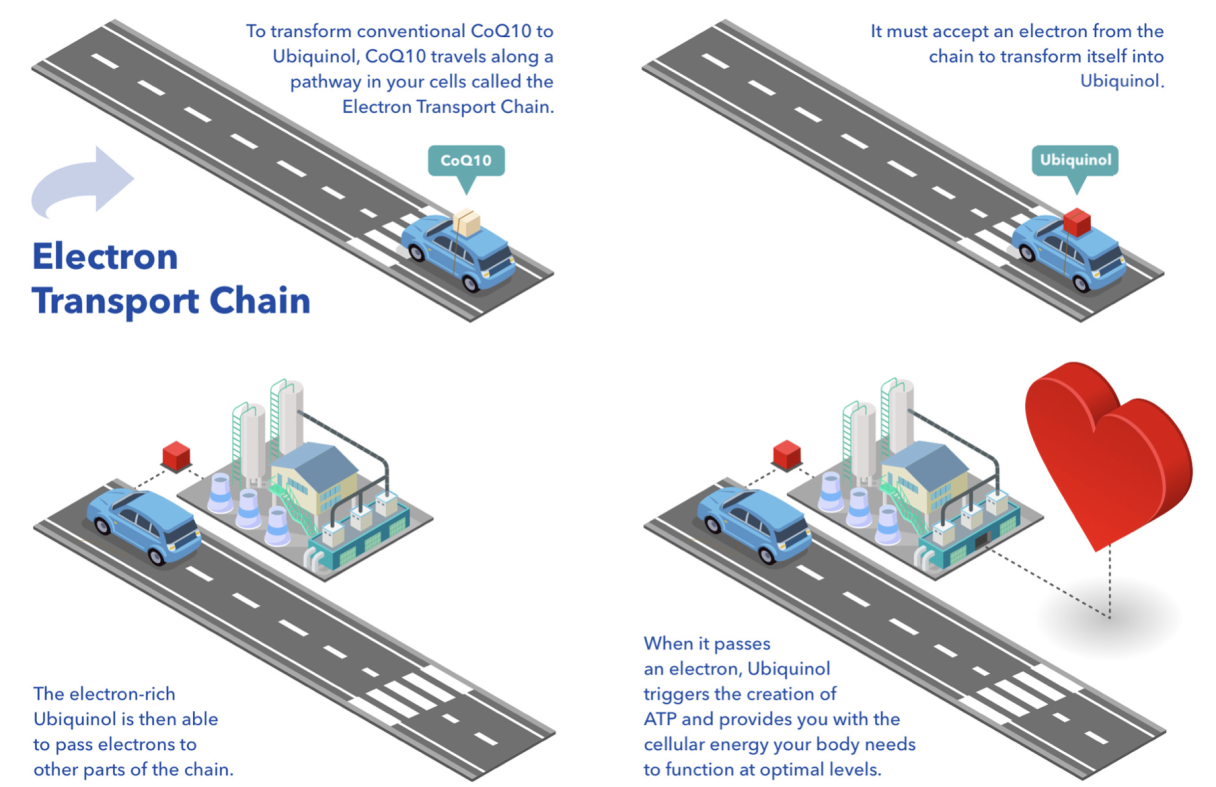
How is Ubiquinol Produced Naturally in the Body?
The Ubiquinol form of CoQ10 is associated with over 95% of your body’s cellular energy production, which powers your heart and other organs.1 2 Ubiquinol plays a critical role in producing cellular energy by creating an energy-rich molecule called Adenosine Triphosphate (ATP). To help give our bodies a consistent supply of cellular energy, our cells must convert conventional CoQ10 into its active form, Ubiquinol.
That’s why large amounts of Ubiquinol can be found in your heart, brain, liver, kidneys, and other organs that require cellular energy to function properly. In fact, Ubiquinol is found in 95% of our cells!
How Does the Body Make CoQ10?
Contrary to popular belief, your body doesn’t actually make CoQ10. It is found throughout the body on the cellular level, especially in the mitochondrial membranes of the lungs, kidneys, spleen, kidneys, liver, pancreas, adrenal glands—and, of course, in our hearts.
As we age, our CoQ10 level naturally decreases, meaning that we need to replenish it through supplements or by eating foods rich in CoQ10, like avocados, steak, and more. It can be tough to replenish just by eating certain foods, however. In order to consume 100mg of CoQ10 a day, which is typically recommended in supplement labeling for adults, you’d need to eat 60 avocados a day in order to reach this amount.
Read more: Which Foods Contain Ubiquinol Naturally?
How Does the Body Make Ubiquinol?
While your body can’t replenish its CoQ10 supply on its own, it can use the existing CoQ10 to produce Ubiquinol. Let’s get into how Ubiquinol is created in your body’s cells. Once Ubiquinol is created, it plays an essential role in creating ATP, which helps your organs function optimally. To transform conventional CoQ10 to Ubiquinol, CoQ10 travels along a pathway in our cells called the Electron Transport Chain. It must accept an electron from the chain to transform itself into Ubiquinol. Thanks to this tiny chemical reaction, the electron-rich Ubiquinol is then able to pass electrons to other parts of the chain. When it passes an electron, Ubiquinol triggers the creation of adenosine triphosphate (ATP) and provides you with the cellular energy your body needs to function at optimal levels.
Starting around the age of 40, it becomes more difficult for your body to turn conventional CoQ10 into Ubiquinol.3 4 The process becomes less efficient, which is why so many “older” adults are now taking Ubiquinol, the more advanced form of CoQ10.
To learn more about what Ubiquinol can do for you, download our Ubiquinol Beginner’s Guide.

Starting around the age of 40, it becomes more difficult for your body to turn conventional CoQ10 into Ubiquinol.3 4 The process becomes less efficient, which is why so many “older” adults are now taking Ubiquinol, the more advanced form of CoQ10.
References
- Becker WM and Deamer DW. Energy from Chemical Bonds: The aerobic mode. In: The World of the Cell, 2nd Ed., The Benjamin Cummings Publishing Company, Inc, Redwood City , CA., pps. 275-313.
- Forsmark-Andrée P, Ernster L. Evidence for a protective effect of endogenous ubiquinol against oxidative damage to mitochondrial protein and DNA during lipid peroxidation. Mol Aspects Med. 1994;15 Suppl:s73-81
- Wada H, Goto H, Hagiwara S, Yamamoto Y. Redox status of coenzyme Q10 is associated with chronological age. J Am Geriatr Soc. 2007 Jul;55(7):1141-2.
- Niklowitz P, Onur S, Fischer A, Laudes M, Palussen M, Menke T, Döring F. Coenzyme Q10 serum concentration and redox status in European adults: influence of age, sex, and lipoprotein concentration. J Clin Biochem Nutr. 2016 Jan. Online publication.




